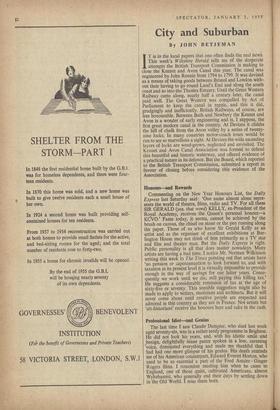City and Suburban
By JOHN BETJEMAN IT is in the local papers that one often finds the real news. This week's Wiltshire Herald tells me of the desperate attempts the British Transport Commission is making to close the Kennet and Avon Canal this year. The canal was engineered by John Rennie from 1794 to 1799. It was devised as a means of taking goods between Bristol and London with- out their having to go round Land's End and along the south coast and so into the Thames Estuary. Until the Great Western Railway came along, nearly half a century later, the canal paid well. The Great Western was compelled by Act of Parliament to keep the canal in repair, and this it did, grudgingly and inefficiently. British Railways, of course, are less honourable. Between Bath and Newbury the Kennet and Avon is a wonder of early engineering and is, I suppose, the first great modern canal in the country. At Devizes it climbs the hill of chalk from the Avon valley by a series of twenty- nine locks. In many countries motor-coach tours would be run to see so marvellous a sight. At Devizes the wide ascending layers of locks are weed-grown, neglected and unvisited. The Kennet and Avon Canal Association was formed to defend this beautiful and historic waterway, and offered evidence of a practical nature in its defence. But the Board, which reported to the British Transport Commission, submitted a report in favour of closing before considering this evidence of the Association.
Honours—and Rewards Commenting on the New Year Honours List, the Daily Express last Saturday said : 'One name almost alone repre- sents the world of theatre, films, radio and TV. For all these SIR GERALD (yes, that word) KELLY, ex-President of the Royal Academy, receives the Queen's personal honour—a KCVO.' Fame today, it seems, cannot be achieved by the brush on canvas, the chisel on stone or the pen running along the paper. Those of us who know Sir Gerald Kelly as an artist and as the organiser of excellent exhibitions at Bur- lington House may not think of him primarily as a TV star and film and theatre man. But the Daily Express is right. Public personality is all that does matter nowadays. Many artists are having a bad time. I notice Mr. Norman Wilkinson writing this week in The Times pointing out that artists have 'no pension or superannuation to look forward to, and with taxation at its present level it is virtually impossible to provide enough in the way of savings for our latter years. Conse- quently we work until we die, still paying this killing tax.' He suggests a considerable remission of tax at the age of sixty-five or seventy. This sensible suggestion might also be made to apply to writers, musicians and architects. But it will never come about until creative people are respected and admired in this country as they arc in France. Not artists but 'aft-historians' receive the honours here and rake in the cash.
Professional Idiot—and Genius The last time I saw Claude Dampier, who died last week aged seventy-six, was in a rather seedy programme in Brighton. He did not look his years, and, with his idiotic smile and benign, delightfully inane patter spoken in a low, caressing voice, dominated everything and made me thankful that I had had one more glimpse of his genius. His death reminds me of his American counterpart, Edward Everett Horton, who used to be so essential a part of the Fred Astaire - Ginger Rogers films. I remember meeting him when he came to England, one of those quiet, cultivated Americans, almost Wykehamist, who generally end their days by settling down in the Old World. 1 miss them both.














































 Previous page
Previous page